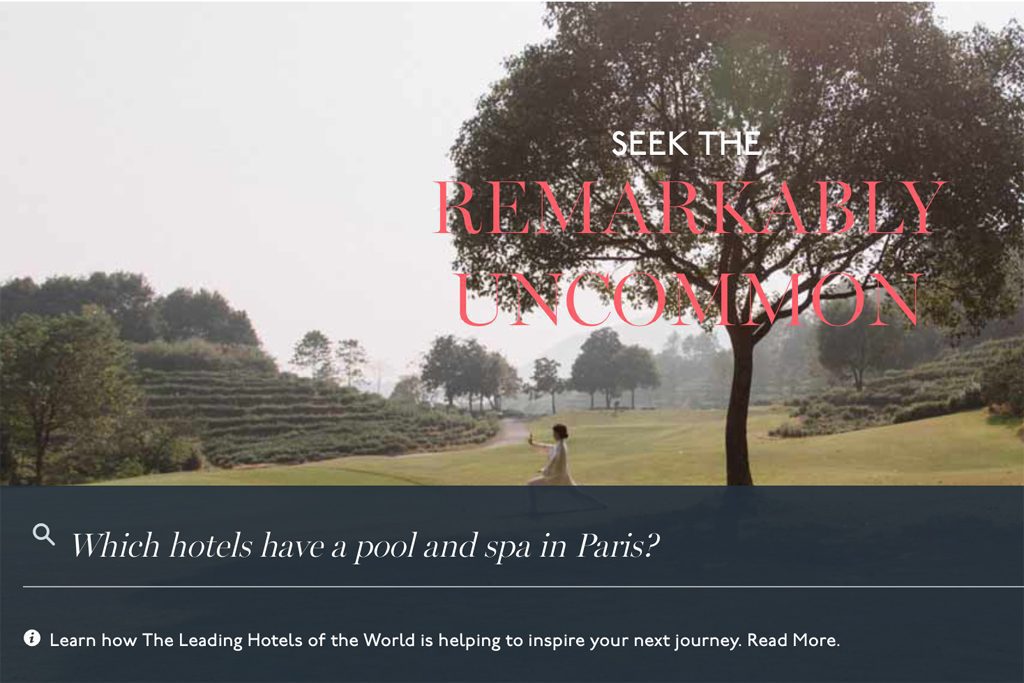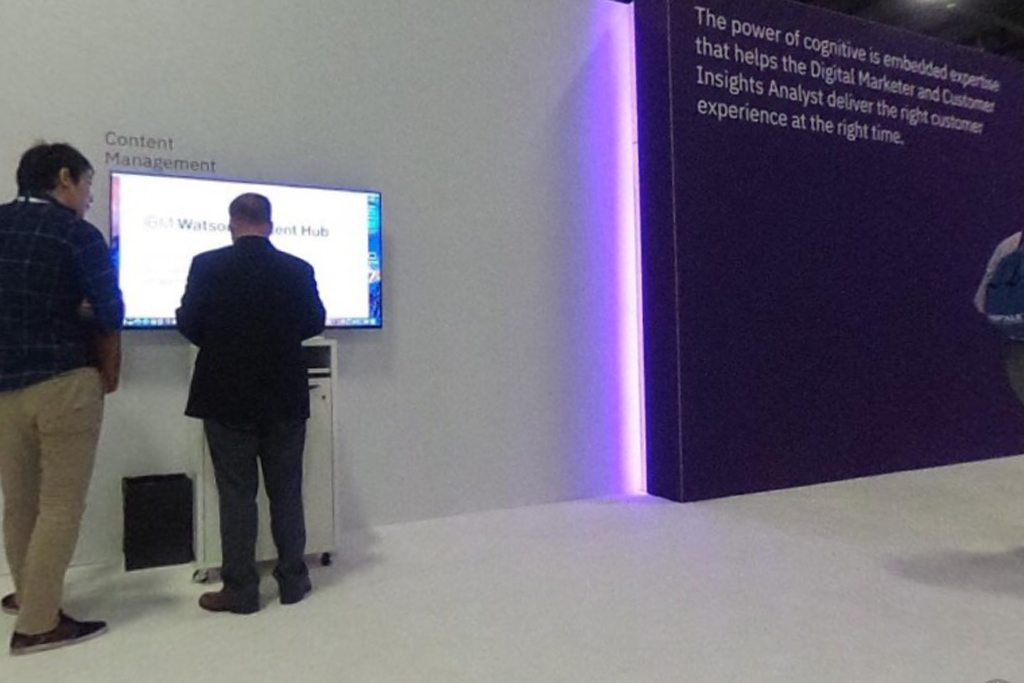Skift Take
Five years ago, no one thought about IBM as being a big seller of digital marketing tools to travel companies. That's changed. Big Blue has landed some big deals. Yet the easy wins may be behind it.
Since 2010, International Business Machines has gone deeper into marketing — including travel marketing — through a series of acquisitions.
IBM acquired web analytics firm Coremetrics, multichannel marketing tool Unica, mobile push technology vendor Xtify, and email marketing platform Silverpop.
Then it synthesized these solutions into a new services division, Watson Marketing.
Its star travel clients include Air France and Intercontinental Hotel Group.
But it needs more success. It has to do more to land other travel brands, such as American Airlines, Hilton, and United, that work in other areas with IBM.
Adding Watson Artificial intelligence
Watson refers to IBM’s cognitive artificial intelligence (AI) platform.
Watson is best-known for tricks like defeating contestants on the U.S. quiz show “Jeopardy!” It can interpret questions users ask it in plain English, sift rapidly through digital records for clues, and then evaluate those clues and combine them into answers that it can explain in natural language.
A year ago IBM began adding Watson to its marketing suite — putting some of its marketing industry competitors on notice that it intends to be a serious player.
In the travel sector, IBM Watson Customer Engagement (which Watson Marketing falls under) is attempting to help airlines, hotels, casinos, and resorts with campaign automation, real-time personalization, and similar digital marketing tools.
Jay Henderson, director of Watson Marketing, explains in a phone interview: “We help marketers streamline how they acquire and retain customers. We also help marketers deliver more personalized interactions with their customers, and make it easier for them use natural language questions to get the data points they need. We also offer simple automation of routine tasks.”
Mammoth Case Study
For example, Henderson cites a recent project for Mammoth Resorts, a large mountain resort operator in California.
Mammoth uses IBM’s tools to drive engagement. For instance, if a customer scans a pass or lift ticket at a resort, the IBM-powered system can send an email to the customer on the same day with a promotion.
Mammoth says the email click-through rates on its campaigns rose from 8 percent to 34 percent, year-over-year, between June 1 to September 30 2016. (Click-through rates measure the number of people who clicked on a link in an email compared with the number of people who opened the email.)
A typical example of one of these campaigns would be that, after a customer visit to Mammoth Resorts, he or she would receive relevant emails to entice them for return visits. Someone who visited in February might get a discount to come back in June, for instance.
IBM’s Henderson says, “A lot of times where companies struggle is, ‘How do I take the insights I get from customer behavior on my website and scale up the amount of personalization I can do by automating email messages in response?'”
What’s Watson Got to Do With It?
Lots of companies can help travel brands apply best practices in digital marketing to their campaigns, such as with automatic messages, and provide analytics dashboards.
IBM aims to stand out from marketing competitors by adding its layer of artificial intelligence technology.
A marketer can interact with a chat-style bot powered by Watson to ask questions about their campaigns, such as “Watson, What was my response rate yesterday compared to past campaigns?” In the past, marketers might have instead used Excel or a reporting and analytics tool, which may have been less intuitive.
Watson can also make recommendations if a marketer’s response rate to a recent campaign wasn’t high, for example. In that case, Watson could suggest actions to be taken.
Competitive Landscape
IBM faces both legacy and budding competitors in marketing-automation services. Adobe has made a big push into the travel vertical with its marketing cloud platform.
Would-be challengers to parts of its services include Microsoft, which has its own cognitive service called Azure. More broadly, Microsoft is also betting on artificial intelligence to help it win more travel companies to its services business.
Other companies, including Accenture, lack the breadth of capabilities seen in the Watson ecosystem but have specialties that could be a competitor to aspects of what the division is doing. Accenture has recently been working with travel tech giant Amadeus on several digital marketing efforts.
Amazon is another possible budding competitor. While Amazon doesn’t offer the range of digital marketing services that IBM does, Amazon’s Web Services cloud-computing division offers a marketplace of digital marketing tools from third-parties that do.
Amazon Web Services already has business relationships with hundreds of online travel companies, such as e-Travel, as a provider of cloud-based tools for managing Web traffic growth. It could use its relationships with companies to cross-market other marketing services.
IBM’s Messaging Problem?
Henderson says IBM’s division can stand out from other competitors in a few ways beyond Watson’s recommendations about what a marketers need to do to improve the efficiency and effectiveness of their campaigns.
He also claims that the user experience of IBM’s products are superior to competitors’ tools because they draw on the parent company’s intensive specialization in design thinking. That means marketers may find its tools easier to use.
Watson Marketing is a strategic bet for the Armonk, New York-based computing colossus. It is one of the several new businesses that IBM hopes will grow faster than sales of the legacy business of providing hardware, software, and services to corporations.
On its two most recent earnings calls with investors, company executives cited high-profile clients in other sectors such as tax preparation firm H&R Block. It hired IBM to deploy Watson-powered customer engagement software across 10,000 branches in the past year.
But executives didn’t mention any travel business clients. That suggests the company isn’t being as effective in getting its message out to clients as possible — somewhat ironic for a marketing business.
The next two years may prove pivotal for Watson Marketing, as executives evaluate the effort.
Regardless of the division’s success, Watson itself appears to be here to stay. IBM offers Watson technology as a layer companies can add.

WAYBLAZeR deal with leading hotels of the world
Confusingly, travel brands can get access to Watson in other ways besides its Marketing Division.
Wayblazer is a separate, Texas-based company that originally had its core business model around applying Watson technology to travel company needs. IBM was an early investor.
But Wayblazer’s use of Watson today is limited, a spokesperson says. The business’s approach now is to use several services and to develop its own patented A.I. application layers.
Wayblazer has helped Fort Worth and Orlando’s tourism boards learn more about, and try to provide better service to, visitors. (See our earlier article, Behind Orlando’s New IBM Watson-Powered Travel App.
What hasn’t been reported yet is that Wayblazer has installed its technology on the website of Leading Hotels of the World, a collection of about 375 hotels in 75 countries that cross-market each other’s properties.
Visitors to the collection’s website can ask natural-language questions for trip-planning and receive answers — all powered by Wayblazer’s Watson technology.
The search/question interface called Trip Discovery is still in testing and has not yet been place on the site’s homepage.
In theory, it lets users describe the trip that they want to go on with details like destination, time frame, amenities, activities, and the ages of who’s traveling, and then fetches a list of hotels with relevant amenities and locations. In practice, it is still working out some of the kinks.
Meanwhile, a few other companies are tapping Watson’s technology without going through its marketing division.
A case in point: Trisept Solutions, a decades old Milwaukee-based travel technology vendor, has long been the computing brain behind VAX VacationAccess, an agent booking platform used by thousands of travel agents.
TriSept has recently infused its customer relationship management tool with Watson’s artificial intelligence to create what it claims are customized travel itineraries for customers based on their past behavior patterns — helping to automate some of the work that agents have to do.
It seems overall that, regardless of how large IBM Watson Marketing becomes, the use of Watson technology in the travel space seems certain to increase.
The Daily Newsletter
Our daily coverage of the global travel industry. Written by editors and analysts from across Skift’s brands.
Have a confidential tip for Skift? Get in touch
Tags: ibm, IBM Watson, marketing, wayblazer
Photo credit: A view from the booth at Watson Marketing in the Cognitive Concourse at IBM Amplify, a trade event conducted in March 2017. Watson Marketing aims to enter more aggressively into travel. IBM
